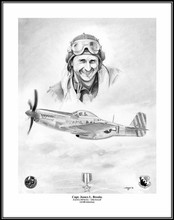 Loading... Please wait...
Loading... Please wait...- Home
- Combat Pilots/Pencil Drawings ~ Free Shipping
- Capt. James L. Brooks ~ Free Shipping
Product Description
Print Size: 11" x 14" ---- Unlimited Print Edition
Captain James L. BrooksJames L. Brooks - A native of Roanoke, Virginia, James L. Brooks entered the Army Air Corps in 1942. Jim attended pilot training at Kelly and Moore Fields, Texas, and upon graduation as a second lieutenant, he was assigned to the 52d Fighter Squadron stationed in the Panama Canal Zone. He spent seven months in this assignment flying the P-39 and P-40 fighters before being sent to San Severino, Italy to join the 307th Squadron, 31st Fighter Group. There, Brooks flew Spitfire MK IXs, P-51Bs and P-51Ds, scoring 13 ½ victories. The 31st Fighter Group has the distinction of being the first American group to land in England. It was the first AAF group to go into action with the invasion forces that landed in North Africa, the only AAF group to have a fighter squadron in Italy, the first to suffer a combat casualty, and the first to destroy an enemy aircraft. The 31st Fighter Group produced more aces (thirty-three) than any other group in the AAF, and ended the war first in total aerial victories (571) in the Mediterranean Theater. Major Brooks’ career decorations include the Silver Star, the Distinguished Flying Cross, and the Air Medal with twenty-one clusters. Brooks grew up fast as a young fighter pilot and was leading entire fighter groups, fifty-four Mustangs, as a first lieutenant into the heavily defended German oil refineries in Ploesti, Romania in his personal P-51B, named “January” after his birth month. On 18 May 1944, while escorting the heavy B-24 bombers over Ploesti, he scored his first aerial victory, downing a Romanian G-50 fighter. Throughout the course of his time in WWII, Jim would down Me-109s, Ju 87 Stuka dive-bombers, Ju 52s, Fiesler Storchs, and Folke-Wulf 190s. Shortly after his first kill, Brooks went on a three-day leave to Rome and another pilot from the 307th Squadron took “January” up on a sortie. The pilot experienced engine trouble and had to ditch Brooks’ Mustang into the Adriatic Sea. When Brooks returned to his base in San Severino, there was a brand new P-51D model there to replace his B model. With no real inspiration or girlfriend after which to name his new D model Mustang, he had “February” painted on the nose to follow “January.” Brooks became an ace on 18 July, during a mission over Germany. There was some confusion over the target area and the bombers were not holding to their assigned quadrants. The Mustangs of the 307th Squadron entered combat near Friedrichshaven when they intercepted a large formation of ME 109s. A flight of only four Mustangs took them on, but the overwhelming odds forced them to break off the attack. One ME 109 engaged Brooks, who headed for the mountains at full throttle. Approaching one peak, Brooks waited until the last possible moment to pull up. The ME 109, intent on getting Brooks, hesitated and slammed into the mountain. Brooks finished his combat tour in Italy with 55 missions and 280 combat hours. Brooks had deep gratitude for his crew chief, Staff Sergeant Dill Trest, who kept “January” and “February” in tiptop shape and battle ready at all times. Accepting a regular commission after the war, Brooks became jet qualified in 1946. On 22 December 1950, while flying F-86s with the 4th Fighter Group during the Korean War, Brooks participated in the first big, all jet air battle at 42,000 feet over the Yalu River. Involved were 12MiGs and 4Saber Jets. Following the war, Brooks resigned from the Air Force in 1951 as a major and joined North American Aviation as an engineering test pilot. Over the next six years he logged test flights in all F-86 series aircraft, the B-45 jet bomber, the XF-100’s, and the F-86 rocket augmentation project. He was one of the founders and first president of the Fighter Ace Association and is past president of the Society of Experimental Test Pilots.
Warranty Information
null








